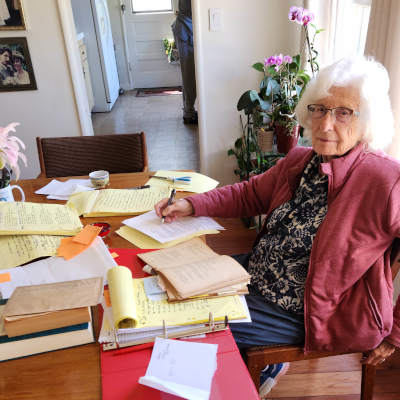Sholem aleykhem,
I’m Dr Sarah Traister Moskovitz, the translator of this collection of poems, Dos Lid is Geblibn, or The Song Remains.

My parents were born in Poland in the late 19th century, and emigrated to the US before the First World War. My father, Yitzkhak Traister, was a Yiddish teacher at the Workmens’ Circle schools, and instilled in me a deep love for the Yiddish language. I was born in 1927 which makes me nearly 97 years old today. I didn’t speak English until I went to school in Springfield, Massachusetts at age 5.
I completed a PhD in Educational Psychology at Yeshiva University, and became a professor at California State University, Northridge. After I retired in the 1980s, I wrote a book called “Love Despite Hate” which was published by Schocken about the post-war lives of child survivors of the Holocaust, from which a number of child survivor support groups sprang up around the world.
As my interests turned more toward the Yiddish language, which becomes more endangered every year as the last generation of native speakers like me die out, I found that the Ringelblum Archive that had been buried under the Warsaw Ghetto contained a large number of poems by obscure authors documenting the lives of the final generation of Polish Jews as they faced liquidation. I published these poems on the web site “Poetry in Hell”.
About 15 years ago, I rediscovered a book on my shelf that my father had given me – Dos Lid is Geblibn, an anthology of poems by authors who were murdered during the Nazi occupation of Poland, collected by Binem Heller, and published in Warsaw in 1951 by the then Communist government. There are not many copies of this book left, mostly in dusty archives in research library basements. Until now, these poems have not been available online, and only a few of them have been translated into English.
I have been working hard translating these poems over the last few years, and we are making them available online, to anyone who is interested, on our web site thesongremains.org. There are 36 authors in the collection, and over 160 poems, and the text of all of the poems, in both Yiddish and English, is searchable and discoverable.
The poems cover the complete range of Jewish life in Poland, with poems about the light-hearted love of nature, to the trials of coming of age in the Ghetto, and of course trying to come to terms with hatred, destruction, and death. And given the context of the time and place in which these poems were written, in Poland in 1939 to 1945, some of the poems celebrate Communism as the savior from the twin evils of Capitalism and Fascism. These poems are both a celebration of a cultural milieu that has been utterly destroyed, as well as a timely reminder for us in the 21st century in the so-called free world.
I hope that this collection will be a lasting legacy for the language that I love so much, and a tribute to the poets and unique culture that were so brutally destroyed by the Nazis.
We can all be proud and strengthened by the writers in this book of poems, who found their own strength and courage in the ruins of the Polish ghettos where they were imprisoned, kept sick and hungry by the Nazis. And yet, despite everything, they were still able to create beautiful, creative, meaningful, and honest poetry.
We will be publishing one poem per week on this web site. You can subscribe to updates here on the site. I hope you find meaning and some joy in the collection, and certainly pride in the poets who under terrible circumstances, pursued their love of poetry. Thank you.
You might enjoy this podcast from The Yiddish Voice on WUNR 1600 AM Brookline, Massachusetts USA, where Mayer (Mark) David interviews Sarah about The Song Remains, among other things.
You might also like to watch this story about Sarah’s involvement with the holocaust survivor community:
Dr Sarah Traister Moskovitz z”l died on 1 September 2024, after a beautiful journey through assisted death.
You can read her obituary on this site.